Success stories and sharing good practice

You can read more about some of successes towards gender equality and good practice across the institution below.
The work we've been doing towards gender equality
- Chemistry is prioritising educating the department about diversity issues, through a standing ED&I item at the termly departmental meetings. Presentation topics include gender-related issues, barriers in the research environment, gender pay gap, and active bystanders. Colleagues are encouraged to raise awareness around these topics and to recognise and challenge their own unconscious biases.
- The Mathematics Institute has a strong focus on EDI awareness events, including the annual special departmental seminar and social event in May: Celebrating Women in Maths Day.
- The Mathematics Institute has a partnership with the student-led Warwick Mathematics Society, that includes collaborative organisation of the annual Ada Lovelace Day showcasing the lives and achievements of female mathematicians, including those from Warwick.
- WMG hosted an external speaker to learn about their department’s Athena Swan Gold Award, sharing examples of what works at both departmental and institutional level. Representatives from 23 Warwick departments attended, and our annual Gender Equality Awards were presented at this event, to recognise and celebrate gender equality work in our community.
- Psychology staff co-created a survey with a Masters student to explore the impact of COVID on working patterns, emotional labour and life satisfaction. The survey questions and findings will be shared more broadly across the university.
- Physics leads a Women in Physics Network that is open to all female and gender minority staff, postgraduate and final year undergraduate students. Some events run by the network include the whole department, while some are specifically for network members.
- WMG is running a very well-received Buddy Scheme, recognised in the institutional Gender Equality Awards, where all new starters are offered a ‘buddy’, an existing member of staff, who can advise on departmental processes, campus life, and support for specific needs. Those making an international move to take up a post in WMG have a buddy with personal experience of the process.
- Warwick Medical School (WMS) ran a successful New Starter Networking Event which it is intended will become an annual event. It provided an important networking activity, particularly for staff joining during the years impacted by the pandemic.
- WMS is continuing to develop in-house expertise and deliver a range of activities to support Women’s Health and Menopause, including in-house training for all staff and managers, development of bespoke training for line-managers, fitness classes, and access to sanitary products through the Emergency Sanitary Products and Period Poverty campaign.
- Physics created a new Equality, Diversity and Inclusion webpage on the departmental homepage, to ensure central signposting for current/prospective staff and students to departmental and institutional support and networks.
- School of Engineering has embedded a initiative whereby staff are invited to record caring responsibilities and how these affect their working patterns, so that this can be taken into account when timetabling teaching for each academic year.
- Statistics acted as a business host for the EY Foundation (which seeks to provide small projects for disadvantaged young people) in the context of scoping a required breastfeeding/expression room. This included visits to the University nursery and breastfeeding/expression rooms at Warwick, enabling young people to meet parents of young children, and subsequent delivery of a presentation to stakeholders including Estates, Statistics, and associated academic departments. This supported progress, helped identify shortfalls in the scope of existing provision at Warwick, and promoted inter-departmental collaboration.
- The Mathematics Institute has a partnership with Piscopia, a student-led UK network of female and non-binary mathematics students, collaborating with the Warwick Piscopia chapter to run conferences aimed at increasing the proportion of female students progressing to postgraduate study.
- School of Engineering has an Educational Partnership with the Women’s Engineering Society, which has enabled the establishment and ongoing support of the student-led Warwick Women in Engineering and Science society.
- WMS has established a series of Research Culture Cafes and a burgeoning Research Culture Community, in response to a recent Athena Swan survey showing that improvements in the working environment would be welcome. The café-style group discussions, informed by Wellcome Trust activities, enable staff and students to discuss their experiences and identify both highlights and opportunities for improvement and change. This is informing development of a ‘Roadmap’ towards a more positive, vibrant, inclusive, and healthy research culture.
- Physics has used departmental funds to expand access to the conference care fund to include PGR students as well as staff.
- Computer Science ran a facilitated staff focus group on mechanisms of being heard. Actions undertaken include agreeing a code of good practice for the main departmental committees, and setting up a social activities subgroup organising events to improve wellbeing and sense of belonging.
- School of Life Sciences (SLS) has campaigned successfully to grow the membership, diversity, and impact of its Athena SWAN committee for both staff and students, with particular efforts to create undergraduate discussion forums and departmental feedback routes for minority groups.
- Computer Science learned about ‘influences on female motivation to study computer science’ through a Marketing team-led report based on research papers and applicant survey data, and the findings are supporting broader widening participating work, highlighting the importance of interactions at open days and website presence, including the need for a diversity of relatable role models, a focus on the ‘human experience’, the wider societal impact of Computer Science and associated career opportunities.
- WMS established the WMS Athena SWAN Beacon Internships to champion diversity and equitable access to clinical research for medical students. This staff-student collaboration supports 5 MBChB students annually from under-represented groups in clinical academia.
- WMS PhD students have generated and distributed a science newsletter (including a competition with a £50 voucher prize) to secondary schools via an outreach distribution list reaching under-privileged areas.
- School of Engineering awards 5 Women in Engineering Scholarships annually to first year undergraduate students who demonstrate their capacity and commitment to be ambassadors for women in the engineering sector.
- Inspiring Women - A series of talks by female speakers followed by interactive workshops to support your career development. Events are open to staff and students. There is also the Inspiring Women Student Series - this series is no longer running, but you can catch up on all previous speakers with the recordings available on the webpage.
- Set up a Diversity Book Club in your department: Conveners of the Chemistry Diversity Book Club are keen to disseminate any learning and insights from the Club, empowering colleagues across the UK (and the globe) to start similar initiatives. Find resources developed by Chemistry to support others in setting up similar clubs, here.
- PLOTINA - a platform of resources that can be used by research performing organisations across Europe to implement their gender equality plans. You can watch a range of videos from the PLOTINA project here.
- Womens careers: Warwick supports programmes such as the Aurora Womens-only Leadership Programme.
- Womens societies: WBS Women's Professional Network, the Women of Warwick WI, Women in Engineering, Women in Physics, and Women in Chemistry.
- Student programmes and societies: Warwick hosts a number of student programmes and societies such as the Sprint Programme, Women for Women International, and the Black Women's Project.
- The Centre for the Study of Women and Gender is an interdisciplinary centre of research and teaching in women's, gender, and feminist studies. Get involved with the CSWG here.
Departmental best practice examples
As part of our Athena Swan work, Warwick Business School set-up the Athena Swan Network for Business Schools. The network is intended to build support, share experiences and recognise good practice within the sector related to the advancement of gender equality.
From an initial event at The Shard in September 2018 with 18 attendees from 12 institutions, the network now has over 100 contacts, from both professional services and academics, representing more than 47 institutions within the UK and Ireland.
We continued to host the network throughout the pandemic, switching first to a virtual event, before moving to a hybrid format in September 2021. The network will continue in a hybrid format to enable as many members to participate as possible.
The topics discussed at the events, whilst always linked to Athena Swan, have evolved to include other aspects of equality, diversity and inclusion, particularly now with a focus on intersectionality. Each event has contributions from a range of speakers, for example Advance HE on the charter requirements, other Schools sharing their own experiences of Athena Swan, and academics who undertake research in the area.
Chemistry is prioritising educating the department about diversity issues, through a standing ED&I item at the termly departmental meetings. Presentation topics include gender-related issues, barriers in the research environment, gender pay gap, and active bystanders. Colleagues are encouraged to raise awareness around these topics and to recognise and challenge their own unconscious biases.
The ‘We are Chemistry’ project focuses on improving wellbeing, increasing belonging, and building an inclusive community of staff and students in Chemistry through a programme of 100+ events and activities running over the 22/23 academic year. We are Chemistry has been funded £15,000 from the department and is built around four themes: Feel Good, Learn More, Get Active, and Have Fun. The programme linked to these themes includes Therapy Dogs, Black History Month Film Screening, Pumpkin Carving, Study Happy Mindfulness and Yoga sessions, E-Sports nights, Chem Run Club, and Chem Football club activities. The programme is also built around weekly wellbeing check-ins for students, a BAME-Awarding Gap Group to monitor and improve student outcomes, and a new student-led comms strategy that is improving engagement and increasing representation of minority-characteristic groups in the department.
- A monthly forum named ‘Equitea’ has been developed by postgraduate students and staff to discuss topics related to equality, diversity, and inclusion in relation to Astronomy, Physics, and STEM. This is open to everyone and aims to educate, listen to minority voices, and learn about perspectives and topics that might otherwise not have been considered.
- A newly established Warwick Ethnic Minorities in Physics Network has been established by a postgraduate student. Its goal is to bring more transparency to what the university has to offer and what you can take part in at university. The webpage and network also help bring more of a sense of a belonging within the department and across other departments. The network will organise events within the department, with financial support provided from departmental funds for initial networking activities.
-
Leads a Women in Physics Network that is open to all female and gender minority staff, postgraduate and final year undergraduate students. Some events run by the network include the whole department, while some are specifically for network members.
-
Created a new Equality, Diversity and Inclusion webpage on the departmental homepage, to ensure central signposting for current/prospective staff and students to departmental and institutional support and networks.
-
Physics has used departmental funds to expand access to the conference care fund to include PGR students as well as staff.
Creating a departmental ‘Work for Us’ webpage, signposting applicants to flexible working procedures and University support networks. The website has created an opportunity to ‘showcase’ female economists as role models aimed at increasing the number of female candidates applying for roles within the department.
The Mathematics Institute has a strong focus on EDI awareness events, including the annual special departmental seminar and social event in May: Celebrating Women in Maths Day.
The Mathematics Institute has a partnership with the student-led Warwick Mathematics Society, that includes collaborative organisation of the annual Ada Lovelace Day showcasing the lives and achievements of female mathematicians, including those from Warwick.
The Mathematics Institute has a partnership with Piscopia, a student-led UK network of female and non-binary mathematics students, collaborating with the Warwick Piscopia chapter to run conferences aimed at increasing the proportion of female students progressing to postgraduate study.
WMG hosted an external speaker to learn about their department’s Athena Swan Gold Award, sharing examples of what works at both departmental and institutional level. Representatives from 23 Warwick departments attended, and our annual Gender Equality Awards were presented at this event, to recognise and celebrate gender equality work in our community.
WMG is running a very well-received Buddy Scheme, recognised in the institutional Gender Equality Awards, where all new starters are offered a ‘buddy’, an existing member of staff, who can advise on departmental processes, campus life, and support for specific needs. Those making an international move to take up a post in WMG have a buddy with personal experience of the process.
Warwick Medical School (WMS) ran a successful New Starter Networking Event which it is intended will become an annual event. It provided an important networking activity, particularly for staff joining during the years impacted by the pandemic.
WMS is continuing to develop in-house expertise and deliver a range of activities to support Women’s Health and Menopause, including in-house training for all staff and managers, development of bespoke training for line-managers, fitness classes, and access to sanitary products through the Emergency Sanitary Products and Period Poverty campaign.
WMS has established a series of Research Culture Cafes and a burgeoning Research Culture Community, in response to a recent Athena Swan survey showing that improvements in the working environment would be welcome. The café-style group discussions, informed by Wellcome Trust activities, enable staff and students to discuss their experiences and identify both highlights and opportunities for improvement and change. This is informing development of a ‘Roadmap’ towards a more positive, vibrant, inclusive, and healthy research culture.
WMS established the WMS Athena SWAN Beacon Internships to champion diversity and equitable access to clinical research for medical students. This staff-student collaboration supports 5 MBChB students annually from under-represented groups in clinical academia.
WMS PhD students have generated and distributed a science newsletter (including a competition with a £50 voucher prize) to secondary schools via an outreach distribution list reaching under-privileged areas.
School of Engineering awards 5 Women in Engineering Scholarships annually to first year undergraduate students who demonstrate their capacity and commitment to be ambassadors for women in the engineering sector.
School of Engineering has an Educational Partnership with the Women’s Engineering Society, which has enabled the establishment and ongoing support of the student-led Warwick Women in Engineering and Science society.
School of Engineering has embedded a initiative whereby staff are invited to record caring responsibilities and how these affect their working patterns, so that this can be taken into account when timetabling teaching for each academic year.
Staff and student success stories
Read stories of success for women academics at Warwick over the last few years using the links below:
- Warwick Medical School International Women’s Day Seminar (March 2021).
- Celebrating women in science (February 2021).
- Congratulations to Dr Caroline Petit, awarded the Friedrich Wilhelm Bessel Research Award from the Alexander von Humboldt Foundation (January 2021).
- Congratulations to Professor Pam Thomas - appointment as a council member of the Science and Technology Facilities Council (January 2021).
- Bo Kelestyn wins Butterworth Memorial Award (November 2020).
- New senior appointments - Gwen van der Velden, Deputy Pro-Vice-Chancellor (Education) (October 2020).
- Professor Akwugo Emejulu recognised with fellowship award (October 2020).
- Queen’s Birthday Honours for Professor Debra Bick and Ms Rosie DrinkwaterLink opens in a new window (October 2020).
- Congratulations to Professor Pam Thomas - appointment as CEO of the Faraday Institution (September 2020).
- Letizia Gramaglia becomes a Principal Fellow of the HEA (September 2020).
- UK study at Warwick will evaluate the pressures of COVID-19 on working-class women (July 2020).
- Professor Rebecca Earle New Fellow of the British Academy (July 2020).
- International Conference of Women Engineers and Scientists to be held at Warwick (June 2020).
- Warwick Aurora Alumnae group established (June 2020).
- Academic, Dr Charlotte Croft, returns to nursing to help NHS in pandemic (June 2020).
- Warwick part of national #CombatMisconduct project (January 2020)
- Enhanced maternity and adoption schemes (January 2020).
Read stories of success for women students at Warwick using the links below:
- PhD student, Liz Corrigan, receives BEM for services to healthcare (January 2021).
- Warwick Alumni, Sandy Tang, MasterChef finalist (October 2020).
- Floriane Fidegnon-Edoh wins Engineering Student of the Year (September 2020).
- LLB student, Francesca Mitrofan, awarded CUHK Global Law Scholarship (April 2020).
- GSD student, Maddie Booth, holds art exhibition to raise awareness of gender based violence (March 2020).
- Phd Researcher, Alison Porter, long-listed for the National Poetry Prize 2019 (March 2020).
- Warwick Law and Business student, Jagoda Kochan, wins Commercial Awareness competition (March 2020).
- Hollie Ryan, Maddie Booth, and Ellie Church launch reusable cup sharing system on campus (March 2020).
- Law student, Danielle Oreoluwa Jinadu, talks Sickle Cell Anemia at International Women’s Day (February 2020).
- The Black Women's Project wins two awards at the Bright Network’s Society of the Year Awards 2019 (January 2020).
See below profiles of women in academia working at Warwick which highlight the impact of University and Department initiatives and good practice.
Dr Christine Ennew, Provost
Christine Ennew is Provost at the University of Warwick where she supports the Vice Chancellor in the academic leadership of the University. A key aspect of her role is leading the development and delivery of the University’s academic strategy, ensuring that Warwick remains competitive and relevant within HE and beyond. She is responsible for the efficient and effective use of academic resources (including departmental resources, capital planning and space management, and information resources). In addition, she is Chair of the University’s Social Inclusion Committee and is the Executive Board lead for the University environmental sustainability strategy and its implementation.
Christine graduated from Cambridge University and completed her PhD at Nottingham. She was previously one of Nottingham’s Pro-Vice-Chancellors and served as Provost and CEO of the University of Nottingham Malaysia Campus. She joined the University of Warwick in August 2016.
She is currently a member of the Board of Directors for Common Purpose Student Experiences. She is also a Board Member for the Higher Education Funding Council for Wales (HEFCW) and Chair of its Regulation Committee.
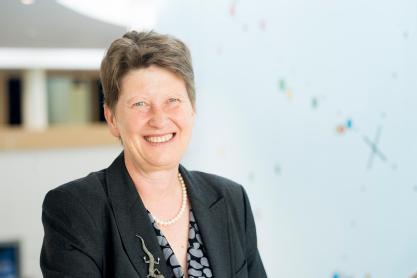
Professor Kate Seers, Warwick Medical School
Kate Seers is Professor of Health Research and leads Warwick Research in Nursing, Warwick Medical School, where she is Head of Academic Career Development. She also chairs the Institutional Athena Swan Self-Assessment Team, and is the academic lead for the University of Warwick’s shadowing programme.
Kate graduated from Chelsea College, University of London with a first class honours degree and RN from Charing Cross Hospital, and completed her PhD at Kings College, London.
She was awarded a DSc by the University of Warwick in 2013, which recognised “a sustained and original contribution of the highest distinction within her field of study.” Kate was listed as a “highly cited” researcher on Thomson Reuter’s list in 2014, ranking her among the top 1% most cited for her subject field.
Kate was awarded a diploma in coaching and mentoring in 2010 and a National Employment and Workplace Mediation Certificate in 2011. She also gained a Senior Fellowship in the Higher Education Academy in 2018.
Kate has a range of interdisciplinary expertise, and is especially expert in pain management, complex interventions, and implementation of evidence into practice. Her methodological expertise covers quantitative and qualitative systematic reviews, RCTs, Mixed methods, and a range of qualitative approaches. Kate was on the NIHR Health Services and Delivery Research Board from 2010-2018. She is also an editor on the Cochrane Pain Cochrane Pain, Palliative & Supportive Care Review Group. Kate has had the pleasure of supervising 23 PhD students to completion and has acted as PhD examiner 40 times.
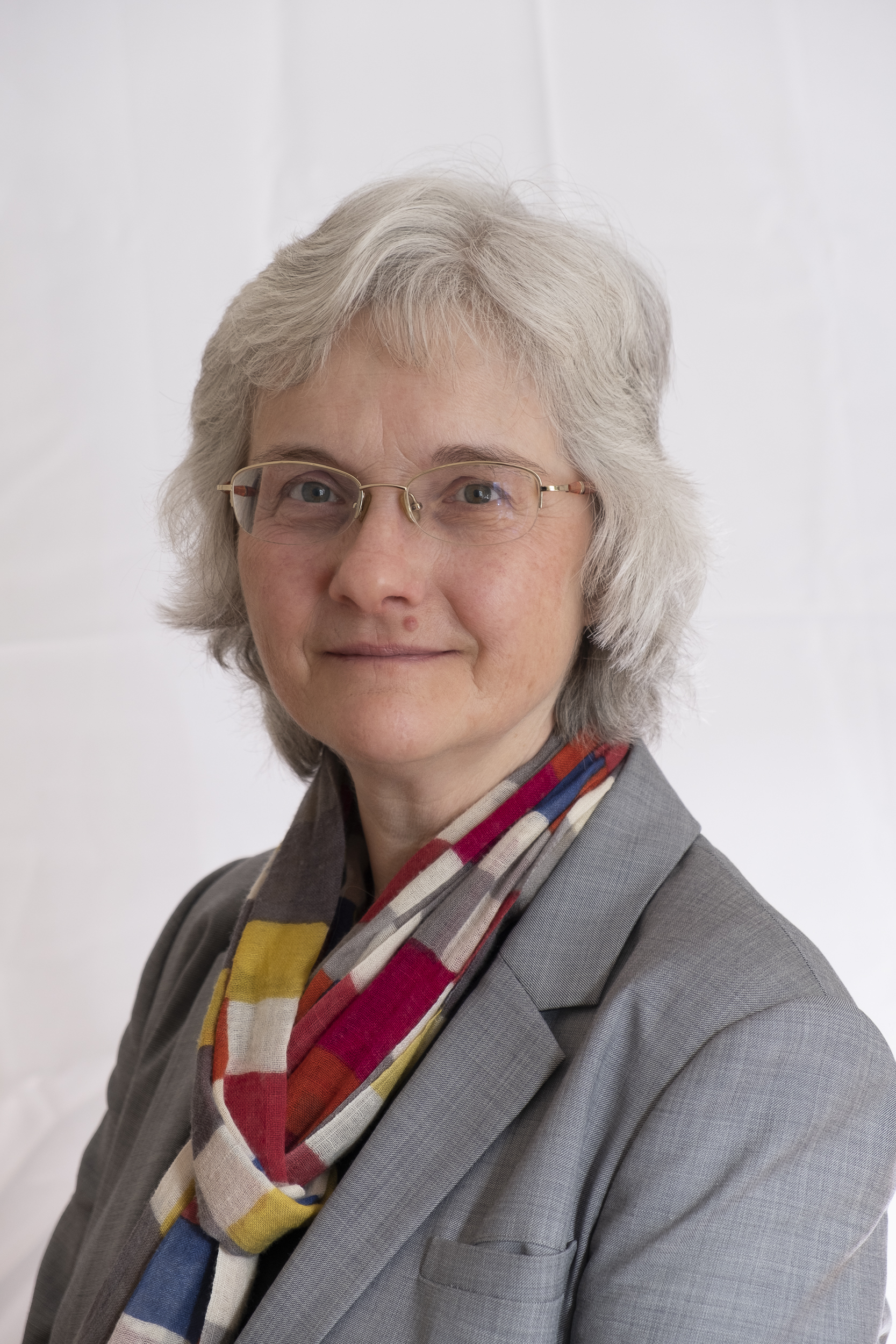
Dr Clare Lyonette, Institute for Employment Research
Dr Clare Lyonette is a Principal Research Fellow and Director of Graduate Studies at the Institute for Employment Research (IER) in the Faculty of Social Sciences. Clare’s research focuses upon gender and the labour market, particularly work-life balance, women’s careers, changing gender roles, the division of domestic work and childcare, part-time work and other flexible working arrangements, and she has published widely in these areas. Clare is fully committed to reducing the barriers to women’s equal participation in the labour market and gender discrimination, both in the workplace and in the home, and her ongoing work reflects this focus.
Clare came to academia relatively late, after working in animation for many years. After returning to the UK from Australia in 1994, she began a degree in Psychology at Brunel University (with a year’s maternity leave to have her second child) and she graduated with First Class honours in 1999. She then went on to do a PhD at the University of Southampton, which she completed in 2003. Since then, she has worked at City University on a project entitled ‘Employment and the Family’ in the ESRC-funded Gender Equality Network (genet.ac.uk) and joined IER in 2009. She is currently working on a project funded by UK Feminista and the NUT on the extent of sexism in schools and a longitudinal project for the NASUWT on the impact of changes to teachers’ pay on equality in schools in England. Clare recently completed a project for the Nuffield Foundation on student mothers’ higher education participation and early career outcomes over time. Clare has two children and has worked both full-time and part-time during her time at IER.
Read more on Clare's research.
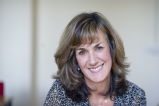
Dr Susan Burrows, Department of Physics
Dr Susan Burrows is a married mother of two working in the Physics department as a research fellow. She has worked part-time at Warwick for a number of years & currently carries out her research in the Ultrasound group, after a background in glasses and ceramics. She is also chair of the Welfare and Communication group in the Physics department, which address under-representation of women in university physics and encourages good practice for both women and men. Being at Warwick enabled her to be flexible in her career leading to a good work-life balance.
Read more on Susan's research opens in aLink opens in a new window.
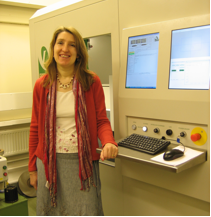
Professor Julie Macpherson, Department of Chemistry
Professor Julie Macpherson was awarded a University Royal Society Fellowship (URF) in 1999, which was held in the Chemistry department. Julie was supported as any new junior academic in the department would be and was given an office, laboratory space and a departmental studentship in addition to a monetary contribution towards equipment she wished to purchase to start her research programme. Julie took on teaching duties but at a reduced rate given her URF position. She had several people (from Warwick Chemistry) who actively participated in mentoring her research career, including Professors Patrick Unwin and Alison Rodger, who helped her enormously. The department early on made a commitment to take over the payment of Julie’s salary at the end of her fellowship and actively considered her progress (in terms of promotion). Thus by the time her fellowship ended she had moved from the status of URF to full time academic professor. This rapid rise in title was credit not only to the support of the Royal Society but very much down to the commitment and help the department gave to Julie during her URF years.
Read more about Julie's research.
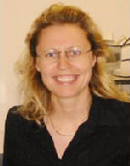
Dr Naila Rabbani, Warwick Medical School
Dr Naila Rabbani is Associate Professor of Experimental Systems Biology and Co-Director of the Protein Damage Systems Biology Group based in the Division of Metabolic and Vascular Heath, Warwick Medical School. She has a joint appointment between the Warwick Systems Biology Centre and Warwick Medical School. Naila was awarded British Heart Foundation Intermediate Fellowship in 2006 and became Associate Professor at University of Warwick in 2010. She is a part of multidisciplinary team working on medical research that spans bench to bedside approaches. Her research makes use of mathematical modelling - a systems biology approach. She has developed state of the art analytical techniques to detect early stage development of diseases such as arthritis, heart disease and diabetic kidney disease. Naila entered her academic life as a mature student with two small children and English as a second language. She has the experience of the difficult but exciting journey from a student to a relatively successful scientist. She says a high level of motivation and ambition is important to achieve your goals; and a supportive environment both at home and at University is crucial too. She received mentoring from Professor Paul J Thornalley that greatly enhanced her ability to do top class research and acquire funds successfully. She strongly believe that the combination of motivation, ambitions, supportive environment and good mentorship will produce successful both male and female scientists.

Excellence in Gender Equality Award
The Excellence in Gender Equality award recognises and celebrates individuals and teams that are making a positive difference within the gender equality agenda in support of this overall commitment.

Annual Reports
From 2020, the Social Inclusion at Warwick Annual Report covers our Athena Swan work and reflects our co-ordinated approach to progress with Social Inclusion.
Our previous Annual Reports on Warwick’s Athena work detail the significant progress made on Athena initiatives at institutional and departmental level:
- Athena Swan Annual Report 2019/20.
- Athena Swan Annual Report 2018/19.
- Athena Swan Annual Report 2017.
- Athena Swan Annual Report 2016.
- Athena Swan Annual Report 2015.
- Athena Swan Annual Report 2014.
- Athena Swan Annual Report 2013.
- Athena Swan Annual Report 2012.
- Athena Swan Action Plan Updated with Progress & Actions 2012.

If you have a success story you'd like to share, let us know at .
